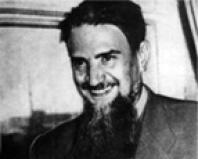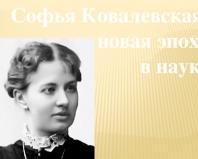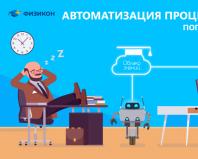Template for teacher portfolio presentation. Template for a portfolio You know, I still believe that if the earth remains alive, The main advantage of humanity Will someday be teachers... - presentation
Do you want to become better at computer skills?
The “Word Search” puzzle is used especially successfully in foreign language lessons; one might even say that this is a classic exercise for students of any age. Completing such a task allows you to “practice” a new word more than once: the player sees the full spelling of the word in the hints, and searches for the word among others. We believe that this puzzle is also effective when learning your native language, learning vocabulary words, new concepts, etc. In this article we will tell you how to make a word search puzzle online.
Read new articles
The national project “Digital Educational Environment” is coming to Russian regions: equipment will be supplied to schools and Internet access will be improved. But let's not forget about the content: what will the teacher do with new but empty computers? A digital classroom is not only computers and the Internet; an important component of the digital environment are tools and services that allow organizing the educational process at school using electronic educational resources.

Slide 1
Compiled by: Shorina A.E., Shimalina N.E. Teachers of the first qualification category of LMDOU No. 1 “Rodnichok”Slide 2
 A teacher’s portfolio is an Individual folder in which personal professional achievements in educational activities are recorded. A set of works of a teacher that connects individual aspects of his activities. A set of materials demonstrating the teacher’s ability to solve the problems of his professional activity.
A teacher’s portfolio is an Individual folder in which personal professional achievements in educational activities are recorded. A set of works of a teacher that connects individual aspects of his activities. A set of materials demonstrating the teacher’s ability to solve the problems of his professional activity.
Slide 3
 Functions of the portfolio Cumulative (selection, collection of works demonstrate the professional achievements of the teacher); Modeling (the portfolio reflects the dynamics of the teacher’s development) Pedagogical (the portfolio supports and stimulates the activity motivation of teachers)
Functions of the portfolio Cumulative (selection, collection of works demonstrate the professional achievements of the teacher); Modeling (the portfolio reflects the dynamics of the teacher’s development) Pedagogical (the portfolio supports and stimulates the activity motivation of teachers)
Slide 4
 The main types of a teacher’s portfolio Portfolio of documents – a selection of certified (documented) individual educational achievements of a teacher Portfolio of works – a collection of various creative, design works of a teacher Portfolio of reviews – a teacher’s assessment of his achievements Comprehensive portfolios – includes the types described above as sections
The main types of a teacher’s portfolio Portfolio of documents – a selection of certified (documented) individual educational achievements of a teacher Portfolio of works – a collection of various creative, design works of a teacher Portfolio of reviews – a teacher’s assessment of his achievements Comprehensive portfolios – includes the types described above as sections
Slide 5
 The principles of a teacher’s work are systematic; reliability; objectivity; structuring of materials, logic and conciseness of all written explanations; neatness and aesthetics of design; integrity, thematic completeness of the presented materials; visibility of work results.
The principles of a teacher’s work are systematic; reliability; objectivity; structuring of materials, logic and conciseness of all written explanations; neatness and aesthetics of design; integrity, thematic completeness of the presented materials; visibility of work results.
Slide 6
 Portfolio sections “General information about the teacher”: last name, first name, patronymic, year of birth; education (what and when did you graduate, the degree you received); labor and teaching experience, work experience in this institution; advanced training (name of the structure where they attended, year, month, course topics); copies of documents, certificates, letters of gratitude; other documents at the discretion of the teacher
Portfolio sections “General information about the teacher”: last name, first name, patronymic, year of birth; education (what and when did you graduate, the degree you received); labor and teaching experience, work experience in this institution; advanced training (name of the structure where they attended, year, month, course topics); copies of documents, certificates, letters of gratitude; other documents at the discretion of the teacher
Slide 7
 II. Results of teaching activities - materials with the results of children mastering the implemented program; materials characterizing the level of development of children’s ideas and skills, the level of development of personal qualities; comparative analysis of a teacher’s activities over three years based on the results of pedagogical diagnostics, the results of students’ participation in various competitions and olympiads, etc.
II. Results of teaching activities - materials with the results of children mastering the implemented program; materials characterizing the level of development of children’s ideas and skills, the level of development of personal qualities; comparative analysis of a teacher’s activities over three years based on the results of pedagogical diagnostics, the results of students’ participation in various competitions and olympiads, etc.
Slide 8
 III. Working materials videotapes with recordings of classes or their fragments; scripts of open events, photographs and videotapes with their recording; list of creative works, abstracts, projects; participation in conferences and seminars (event topics, forms of participation...); the name of author's manuals, didactic games, production of visual aids, diagnostic materials, and other documents.
III. Working materials videotapes with recordings of classes or their fragments; scripts of open events, photographs and videotapes with their recording; list of creative works, abstracts, projects; participation in conferences and seminars (event topics, forms of participation...); the name of author's manuals, didactic games, production of visual aids, diagnostic materials, and other documents.
Portfolio of teacher KORSHUNOVA MARGARITA IVANOVNA MBOU SPASSKAYA SOSH
Portfolio structure 1. General information 6. Results of activities as a class teacher 2. Professional development 7. Scientific and methodological activities 3. My pedagogical concept 8. Participation in professional competitions 4. Academic achievements of students 9. Methodological developments 5. Extracurricular subject achievements of students 10 Educational and material base
1. General information LAST NAME, FIRST NAME, PATRONICAL NAME Margarita Ivanovna Korshunova DATE OF BIRTH 04/07/1996 EDUCATION, QUALIFICATION BY DIPLOMA Higher, graduated from the Arzamas State Pedagogical Institute with a degree in “Teacher of Russian Language and Literature”, I have been qualified as a teacher of Russian language and literature since 1999 POSITION HELD, DATE OF APPOINTMENT TO THIS POSITION AT THIS OU Teacher of Russian Language and Literature since 15.08. 1987. WORK EXPERIENCE IN YOUR SPECIALTY SINCE 1987 WORK EXPERIENCE IN THIS OU SINCE 08/15/1987 AVAILABILITY OF QUALIFICATION CATEGORY, DATE OF ASSIGNMENT Category I, date of assignment 2003, again 2008
My achievements
2. Advanced training Academic. year Course name Number of hours Document 2008-2008 Theory and methods of teaching Russian language and literature 180 Certificate No. 1335
Advanced training (continued) Academic. year Course name Number of hours Document
Certificates
4. Academic achievements of students Performance results based on the results of annual certification (for 3 years). Results of intermediate certification. Results of the final (state) certification in the form of a unified state exam in Russian language and literature 2009.
The percentage of quality was 35.7% Results of the Russian language exam in 9th grade according to the new form 2009-2010 academic year. year o There were 14 students in the 9th grade. “5”-0 “4”-5 students. “3”-9 students “2”-0
Results of the Russian language exam in 9th grade according to the new form for the 2010-2011 school year. year There were 8 students in the 9th grade. "5" - 1 "4" - 2 students. “3”-5 students “2”-0
Monitoring the progress of senior managers Korshunova MI
Dynamics of the quality of knowledge in the Russian language in one class for 3 years (2007-2009) “2007-2008 - 32% “2008-2009 - 36% “ 2009-2010 - 42%
Dynamics of the quality of knowledge in literature in one class for 3 years (2007-2009) 2007-2008-87% 2008-2009-69% 2009-2010-58%
5. Extracurricular subject achievements of students Subject Olympiads Subject competitions List of creative works of students
Subject Olympiads year Subject Level Result 2008-2009 Russian language School Davydova Valya-8kl Literature School Davydova Valya 2009-2010 Russian language School Davydova Valya-9kl Literature School Davydova Valya-9kl
Subject Olympiads year Subject Level Result 2010-2011 Russian language School Selezenkova Nadya-9 grade Russian language District Selezenkova Nadya-15% Shibankova Tanya-12% 2011-2012 Russian language School Lyalina Nadya-39% Literature School
Regional competitions of creative works. year Event F.I. student, class Result 20072008 Essay competition “I look at a photograph” Antipina Irina 3rd place 20082009 Reading competition “Poetry of the War Years” Davydova valya letter Bunegin Dasha letter 2009 2010 competition of creative works “My Family”. Nomination “Essays about family”. 2011 2012 Competition “Letter to the Past” Antipina Ira Andronov Sasha
6. Results of activities as a class teacher. Pedagogical diagnostics in the system of work of the class teacher. Results of psychological and pedagogical monitoring in the classroom. The quality of the class team's performance over 3 years (2007-2009) The results of class participation in collective events at various levels. Student employment outside of class hours.
7. Scientific and methodological activities Individual professional development plan Use of modern educational technologies Participation in seminars, conferences Publications
Innovative educational technologies Educational technologies Examples of use Differentiated learning Assignments of various levels of complexity Developmental learning technologies Lectures, seminars Tests Presentations Lessons-workshops Project-based learning technologies Information and research projects (Research works) Information and communication technologies Use of educational electronic publications on literature and the Russian language, resources Internet networks. Development of presentations for Russian language and literature lessons, lectures and presentations. Carrying out test control of students' knowledge
8. Participation in professional competitions. 2007 Open lesson on literature 2008 Report at the teachers' council "Creative activity in the classroom" 2008 Open lesson in the 6th grade "Noun" 2008 Report at the teachers' council "active form of work with students" 2009 MO Russian language "Regulation. Textbook page" 2010 reading competition "We Remember" 2010 Open lesson in 9th grade "Preparation for the Unified State Exam" 2010 Report at the teachers' council "Use of ITC in literature lessons" 2010 report for parents "The problem of drug addiction. Don’t try to stand alone” 2011 Speech at the pedagogical council “Personally-centered learning” 2011 Open lesson for young specialists. 2012 Participation in the All-Russian Olympiad (Cheboksary)
9. Methodological developments Methodological developments of lessons. Methodological development of extracurricular activities.
10. Educational material base List of reference and encyclopedic literature in the classroom List of methodological literature TSO and related accessories (video/audio materials)
Thank you for your attention!

Contents 1. General information 2. Advanced training and awards 3. Certification information 4. Results of teaching activities 5. Scientific and methodological activities 6. Generalization of experience 7. Extracurricular activities in the subject 8. Work as a class teacher

1. General information Last name First name Patronymic Date of birth Education, degree completed, diploma, date of issue, diploma specialty Total work experience Pedagogical experience for _ Pedagogical work experience in this educational institution. Back to contents

2. Advanced training and awards, incentives Advanced training (name of the structures in which the courses were taken; year, month, subject of the courses). Information about state and municipal awards, diplomas, letters of gratitude. Information about the most significant school incentives. Copies of diplomas from various competitions. Certificates Back to contents





5. Scientific and methodological activities Used educational and methodological complexes Used educational technologies Use of ICT in the educational process; Information about participation in professional and creative pedagogical competitions. Participation in online communities Personal website Back to contents



The use of ICT in the educational process The methodological collection contains _____ presentations. Of these, own developments - _____ Tests - ___________ Electronic textbooks, manuals - _______ ________ lessons conducted using ICT List of Internet resources used


7. Extracurricular activities in the subject List of creative works, abstracts, educational and research works, projects completed by students in the subject; Data on the winners of Olympiads, competitions, competitions, intellectual marathons, etc.; Scenarios of extracurricular activities, photos and videos of events; Other documents characterizing extracurricular activities in the subject. Back to contents

8. Work as a class teacher Analysis of the performance and quality of knowledge of students in the class; Information about the participation of class students in school events, social projects, creative associations, district, city events, etc.; Information about working with parents; Other documents. Back to contents





